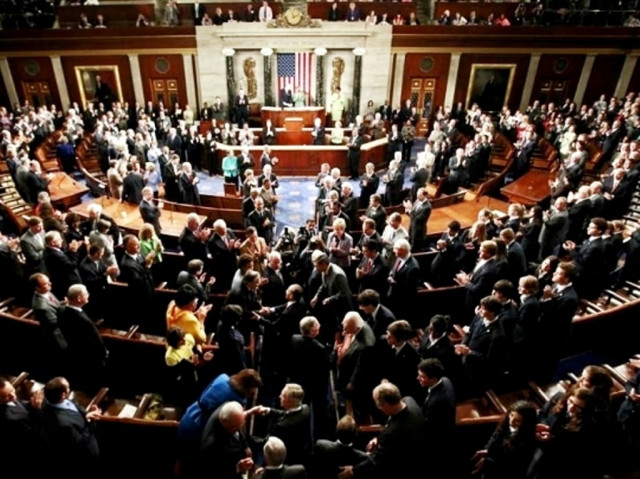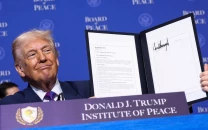Coalition support fund: US Congress links Pakistan payments to NATO routes
Ambassador Sherry says the move will not help bring Pak-US ties back on track.

Coalition support fund: US Congress links Pakistan payments to NATO routes
Though the deed, as it were, has all but been done, the US has shown Islamabad what the repercussions could have been.
US lawmakers vented their frustration on Friday with the closure of Nato supply routes by Pakistan as they debated an annual defence policy bill that seeks $642.5 billion in military spending for fiscal 2013.
House of Representatives lawmakers debating the National Defence Authorisation Act voted almost unanimously (412 to 1 votes) for an amendment that could block up to $650 million in proposed payments to Pakistan unless Islamabad lets coalition forces resume shipment of war supplies across its territory.
Pakistan, for the current fiscal, has budgeted $1.34 billion, or Rs118.7 billion, on account of Coalition Support Fund (CSF) reimbursement – but the US has not released the amount yet. Outstanding CSF dues at present amount to $2.5 billion.
Pakistan had closed down the Nato supply routes in reprisal for a US air raid on border posts that had killed two dozen Pakistani soldiers in November, last year.
Officially, the Pakistani government denies any agreement on the reopening of the vital land routes, but diplomatic sources say Islamabad and Washington have almost clinched a deal.
In the wake of the amendment, CFS will be released if the US defence secretary certifies that “Pakistan has opened the ground lines of communication, is allowing the transit of Nato supplies through Pakistan into Afghanistan, and is supporting the retrograde of US equipment out of Afghanistan.”
The amendment was introduced by Representative Gerald Connolly.
The Express Tribune has learnt that following the passage of the amendment, Pakistan’s Ambassador in Washington Sherry Rehman had a series of meetings with senior Republican and Democratic leaders in the Congress.
She told the Congressional leaders that the amendment “would not help bring the (Pakistan-US) relationship back on track”. She told them that Pakistan “stood to gain more from peace and stability in Afghanistan, and it is therefore incorrect to blame Pakistan for the difficulties in Afghanistan”.
Among others, Ambassador Sherry is said to have met with Nancy Pelosi, Ileana Ros-Lehtinen and Senators John Kerry, Dianne Feinstein and Carl Levin.
Criticism of Afghan war
While debating the defence policy bill, war-weary Democrats nudged President Barack Obama to speed up the withdrawal of US forces from the war zone, but Republicans blocked a debate on the issue ahead of a weekend Nato summit in Chicago to chart a way forward in the decade-long conflict.
Lawmakers debated more than 140 amendments to the policy bill, which seeks $554 billion in base defence spending for the 2013 fiscal year beginning in October and $88.5 billion for the Afghan war and other overseas operations.
The measure has drawn a veto threat from the White House because it would overturn many cuts sought by Defence Secretary Leon Panetta in order to achieve congressional budget targets set last year with the goal of cutting $478 billion in projected military spending in the next decade.
While the authorisation act sets spending limits, it does not actually appropriate funds for defence.
The pressure for an accelerated withdrawal from Afghanistan came ahead of the two-day Chicago summit starting on Sunday where leaders will discuss the final transition to Afghan security control and the withdrawal of international forces by the end of 2014.
Earlier this week Nato Secretary General Anders Fogh Rasmussen invited Pakistan President Asif Ali Zardari to the key gathering of world leaders which will discuss the Afghan endgame. Rasmussen had earlier hinted that Islamabad would be invited only if it unblocked the Nato supply routes.
Rohrabacher’s amendment vetoed
In a related move, the Congress overwhelmingly voted out the Pakistan Terrorism Accountability Act 2012 bill moved by Congressman Dana Rohrabacher.
Three hundred and thirty-five lawmakers voted against, while 84 voted in favour of the bill introduced a week earlier in the Congress.
The bill asked the US administration to provide $50 million each to American citizens “killed as a result of actions of Pakistan’s Inter-Services Intelligence (ISI) or support provided by the ISI to other organisations or individuals, including the Haqqani Network”.
The bill also stated that the $50 million per victim be withheld from US assistance to Pakistan.
It further asked the defence secretary to certify every month how many US citizens had been killed as a result of support by the ISI to the Haqqani Network and other organisations.
(With additional input from REUTERS)
Published in The Express Tribune, May 19th, 2012.



















COMMENTS
Comments are moderated and generally will be posted if they are on-topic and not abusive.
For more information, please see our Comments FAQ